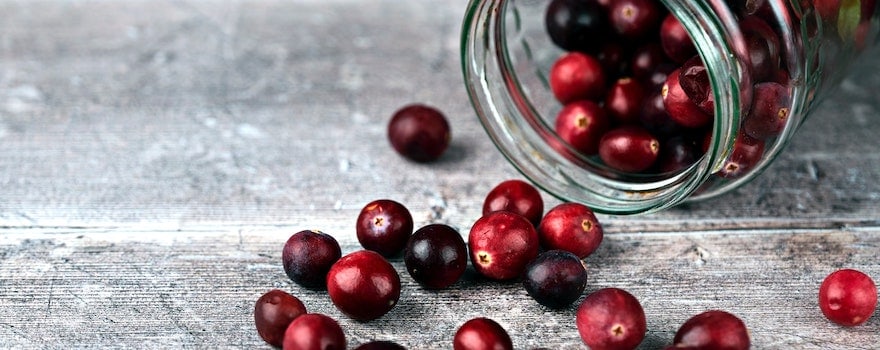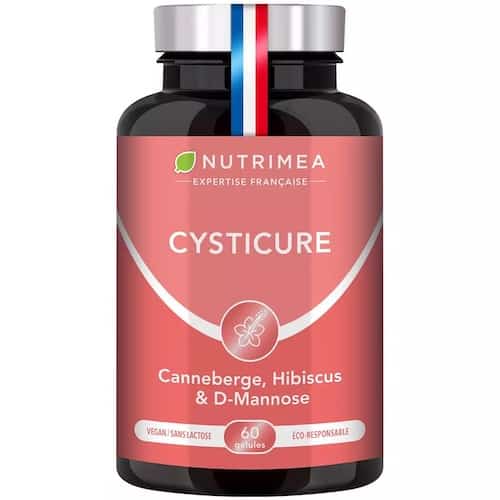Best Dietary Supplements for Cystitis: Our Selection
We analyzed 11 over-the-counter products sold online according to 6 criteria and selected the Cysticure supplement offered by Nutrimea laboratory.
Our Selection Criteria
- Active ingredients: Many active ingredients exist to protect the urinary tract, and some are more effective than others.
- Format: Supplements for cystitis can come in the form of capsules, powder (sticks), or juice.
- Certificate of Analysis: Verification of the absence of heavy metals and suspicious solvents
- Price / day: This is the daily cost of the cure at the recommended daily dose by the brand.
- Customer reviews: These product reviews are collected from the brand’s website, review sites, or Amazon.
- Our brand opinion: Following the tests of dietary supplement brands we conduct each month.
Best Urinary Tract Infection Supplement
Brand: Nutrimea
Active ingredients: Cranberry, hibiscus, D-mannose
Format: 2 capsules per day
Certificates of analysis: conform
Price / day: €0.53
Customer reviews : 4.7/5 (societe-des-avis-garantis.fr)
We recommend this dietary supplement because it is particularly effective and offers excellent value for money. It contains 2 recognized plants against urinary infections, cranberry and hibiscus, as well as D-mannose, which prevents recurrences.
The active ingredient content complies with recommendations, with notably 40 mg of PAC contained in the cranberry extract (minimum required: 36 mg – read our guide below for more information).
The dosage is one capsule in the morning and one capsule in the evening.
Nutrimea is a high-quality French brand offering supplements concentrated in active ingredients at controlled prices (read our comprehensive test here). Its product range is particularly wide.
Use the promotional code DARWIN10 to get a 10% discount (no minimum order required).
What are the causes of urinary infections?
Bacteria in the Bladder
Feeling like you always need to go to the toilet, burning sensation when urinating, abdominal pain? It might be a urinary infection, more commonly known as cystitis.
This condition affects more than one in two women during their lifetime, and recurrences are very common.
A urinary infection is due to the development of microorganisms located in one or more parts of the urinary system. The most frequently found bacterium is Escherichia coli.
This bacterium naturally present in the intestine can be found in the bladder via the urethra and multiplies there.
Main Causes
Contamination by the infectious agent occurs particularly during sexual intercourse, as movements facilitate the migration of germs.
Insufficient or excessive hygiene can also be a cause. Lack of hygiene will promote the arrival of intestinal bacteria at the urinary tract level.
Conversely, excessive hygiene irritates the vaginal flora and promotes the growth of bacteria.
Risk Factors
Underlying health issues (diabetes, kidney stones, neurological diseases), insufficient water intake, or the use of spermicides or certain medications (antibiotics) increase the risk.
Hormonal changes related to menopause or pregnancy can also induce the appearance of a urinary tract infection.
When should you see your doctor?
It is essential to diagnose a urinary infection by the general practitioner during a first episode.
Also consult if you are a man, to avoid complications.
But also during each recurrence episode if symptoms persist for more than 3 days, in case of pregnancy, or in case of associated symptoms (fever, lumbar pain).
The active ingredients and plants to prioritize for treating urinary infections (without prescription)
Note: Urinary infections should not be left untreated because they can quickly become complicated. In prevention or in the case of uncomplicated recurrent cystitis, certain active ingredients can effectively relieve you. If symptoms persist after 48 hours, consult a doctor.
Cranberry

C’est LA plante des infections urinaires. Ce petit fruit contient des molécules appelées proanthocyanidines aux propriétés anti-adhésives1 : they act on urinary tract infections caused by the Escherichia coli bacteria, by blocking its adhesion to the bladder wall.
Une supplémentation en canneberge réduit les symptômes lors d’une infection en cours2.
Une étude3 conducted on 150 women aged 21 to 72 showed that cranberry reduced the number of symptomatic urinary tract infections, as well as the consumption of antibiotics over a year.
Who can use it? Cranberry supplements are well known to women with recurrent cystitis, but some precautions are necessary.
Long-term use increases the risk of kidney stones, and this plant can interact with medications, particularly anticoagulants.
Uva Ursi
Also called bearberry, uva ursi leaves are traditionally used in the treatment of mild recurrent cystitis symptoms.
La busserole contient un actif, l’arbutoside, responsable de l’activité anti bactérienne, capable de soulager les brûlures et le besoin fréquent d’uriner4.
Uva ursi is a powerful plant but not harmless! It is not suitable for everyone or for long-term use.
D-mannose
This sugar similar to glucose is naturally produced by our body and is also found in some fruits.
Le D-mannose diminue l’adhérence de certaines souches bactériennes sur la paroi de la vessie5 et augmente le délai de récidive6 between episodes.
The effectiveness of this compound in the prevention of urinary tract infections has been proven by several studies.
Les résultats sont prometteurs, puisque le D-mannose a montré une efficacité comparable à un antibiotique, la nitrofurantoïne. Les patientes du groupe D-mannose présentaient un risque plus faible d’effets secondaires7.
Probiotics
Probiotics are bacteria or yeasts that help balance the intestinal flora. They are naturally found in natural yogurt, cheese, fermented soy (miso, tempeh).
Taking antibiotics and having an unbalanced diet can alter the intestinal and vaginal flora, contributing to bacterial development.
Une supplémentation en probiotiques permet de réduire le risque de récidive8 of a urinary tract infection, especially after antibiotic treatment.
A review of studies concludes the safety and efficacy of Lactobacillus probiotic strains for preventing urinary tract infections in adult women.
In what form?
In capsules
Choose gastro-resistant capsules for probiotics: this type of capsule resists stomach acidity, is easy to take, and better protects the active ingredients.
Tablets and sachets are generally less effective and do not contain live bacteria when dissolved in the intestine.
For plants, prefer dry extracts: the plant is immersed in a solvent, then dried. Once the alcohol evaporates, the dry active compound of the plant remains.
This form generally allows reaching a sufficient concentration of active ingredients for achieving significant efficacy, particularly for cranberry and uva ursi.
In concentrated juice and decoction
The liquid form is also advantageous: it is very important to drink enough in the prevention and treatment of a urinary tract infection.
Concentrated cranberry juices are a good alternative, as are plant leaf decoctions like uva ursi.

Criteria to consider
The composition
Make sure to have probiotic strains from the lactobacilli family, as they are better acknowledged for their effectiveness in urinary infection contexts.
Decoctions and concentrated juices may contain sugar and preservatives, be sure to check the absence of added flavors; the ingredient list should consist only of plants.
Choose so-called bulk forms to ensure this.
The dosage
For probiotics, the presence of several billion bacteria ensures that a significant portion of the strains reach the action site.
Plants must contain a certain active concentration: sufficient dosage allows for significant action.
Ensure that the daily dose of cranberry capsules provides 36 mg of proanthocyanidins (referred to as PAC), or if in juice form, choose products containing at least 25% (ideally 100%!) pure cranberry juice.
For liquid forms of bearberry, the decoction requires 3 grams (or 3 teaspoons) of leaves per cup of water, three times a day, to obtain a sufficient amount of arbutoside (active ingredient).
Organic certification
Particularly for plant juices and decoctions: organic certification maximizes assurance of pesticide absence, and the control of raw materials.
To verify that a product is truly organic certified, you can find the name of the certifying body on the Organic Agency’s website.
What to do to prevent the onset of a urinary infection?
Daily
- Wear cotton clothes, limit tight clothing to reduce the risk of sweating conducive to bacterial development.
- Frequent changes of sanitary pads and tampons during periods.
- Wipe front to back, urinate right after sexual intercourse, and don’t hold back from going to the bathroom! The longer germs stagnate, the more they multiply.
- Remember to completely empty the bladder with each toilet visit.
- Leave antibacterial soaps on the shelf! They literally strip away the protective vaginal flora and encourage germ proliferation. Opt for a mild soap without alcohol.
In the diet
- In case of cystitis, it’s recommended to drink at least 1.5 liters of water per day to aid in germ elimination.
- You can drink herbal teas based on thyme or rosemary, which have antimicrobial properties.
- Fight against constipation which contributes to germ stagnation: increase the daily intake of fiber, green vegetables, and fruits.
- Limit spices and certain stimulating drinks like coffee or white wine, which can irritate the bladder.
- Boost your immunity by consuming foods rich in vitamin D (sardines, mackerel, smoked herring, tuna), and in vitamin C (bell peppers, citrus fruits, blackcurrant, fresh parsley).
To summarize
Certain criteria must be considered to choose your dietary supplement for urinary infections wisely:
- The composition: Probiotics should contain strains from the lactobacilli family
- The concentration in active ingredient: cranberry capsules should provide 36 mg of proanthocyanidins (known as PAC) per day, juices should be at least 25% (ideally 100%!) pure cranberry juice
- The cultivation method: certified organic for plants, juices, decoctions
- The form: gastro-resistant capsules for probiotics to resist stomach acidity. Prefer dried extracts for plants.
Sources and scientific studies
1.Nicolosi D et al. Anti-Adhesion Activity of A2-type Proanthocyanidins (a Cranberry Major Component) on Uropathogenic E. coli and P. mirabilis; Antibiotics. 2014 Jun; 3(2): 143–154
2. Manzorou M et al. C ranberry Consumption Against Urinary Tract Infections: Clinical Stateof- the-Art and Future Perspectives; Curr Pharm Biotechnol. 2018;19(13):1049-1063
3. Stothers L et al. A randomized trial to evaluate effectiveness and cost effectiveness of naturopathic cranberry products as prophylaxis against urinary tract infection in women; Can J Urol . 2002 Jun;9(3):1558-62
4. Assessment report on Arctostaphylos uva-ursi (L.) Spreng., folium [en ligne]. EMA.
5. Nunzio C.D et al. Role of D-Mannose in the Prevention of Recurrent Uncomplicated Cystitis: State of the Art and Future Perspectives. Antibiotics. Apr 2021;10(4):373
6. Porru D et al. Oral D-mannose in recurrent urinary tract infections in women:A pilot study. European Urology Supplements; Mar 201312(1):e894-e895
7. Kranjčec B et al. D-mannose powder for prophylaxis of recurrent urinary tract infections in women: a randomized clinical trial; World J Urol. 2014 Feb;32(1):79-84
8. Grin P M et al. Lactobacillus for preventing recurrent urinary tract infections in women: meta-analysis. Can J Urol. 2013 Feb;20(1):6607-14




